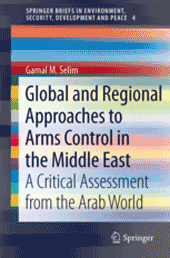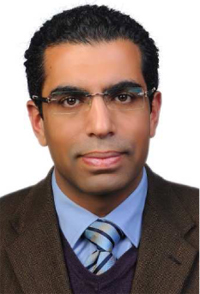|
|
| |
|
| |


SpringerBriefs in
Environment, Security, Development and Peace (ESDP)
A Peer-reviewed Book Series
Edited by
Hans Günter Brauch
Free University of Berlin and AFES-PRESS
 |
Gamal M. Selim [Egypt]: Global and Regional Approaches to Arms Control in the Middle East. A Critical Assessment from the Arab World. SpringerBriefs in Environment, Security, Development and Peace, vol. 4 – Mediterranean Studies Subseries No. 1 (Heidelberg – Dordrecht – London – New York: Springer-Verlag, 2013)
ISBN (Print): 978-3-642-29313-9
ISBN
(Online/eBook):
DOI:
Order Form
Order this book on the Springer Website
Order electronic version and individual chapters
|
Author
|
Book Announcements and Book Reviews |
| |
|
On this Book |
Since the end of the Cold War, the Middle East has witnessed various projects for the establishment of arms control (including CBMs) regimes. Whereas some of these projects were initiated at the global level, others were discussed and debated at the regional level. This book analyses the global and regional dynamics of arms control in the Middle East in the post-Cold War era. It examines American and European arms control projects, the context in which they were presented, the reactions of major regional actors, and their impact on arms control efforts in the region. This book assesses Arab perceptions of the motivations for and constraints on establishing arms control regimes. It also explores the prospects of regional arms control in the context of the ongoing Arab Spring with its ramifications for Arab regional politics, and provides a new perspective on arms control in the Middle East. This volume enriches the debate that is dominated by mainly Western perspectives.
Significance
- Provides an up-to-date review of the literature on the theoretical and policy-oriented approaches to arms control
- Analyses aspects of continuity and change in the global and regional arms control approachs in the Middle East before and after 9/11
- Adds new insights to the literature by offering an analysis of Arab perspective on the arms control debate in the Middle East, thereby distinguishing this volume from other related works on the region, which focus mainly on Western accounts
- Offers policy recommendations on the conditions for successful arms control regimes in the Middle East
Contents Level » Research
Keywords: Arms Control – Confidence-Building Measures – Non-Proliferation – Counter-Proliferation – Middle East – Arab Perceptions – Arab Spring.
Contents: Arms Control and Security Cooperation: Contending Approaches – The Rise of the Arms Control Agenda in the Middle East – The Post 9/11 Era: Is Arms Control still relevant? – Arab Perceptions of Global Arms Control Projects – The Arab Spring and Arms Control: Any Change in Arab Perceptions? – Conclusion and Policy Recommendation
Biography of the Author
|
 |
Gamal M. Selim is an Assistant Professor of Political Science at Port Said University and the British University in Egypt. He obtained a Ph.D. in Political Science from the University of Calgary (Canada). His research interests include theories of international relations, arms control and non-proliferation, politics of development, democratization and Middle East politics. He has given numerous conference papers and has published: “The United States and the Arab Spring: The Dynamics of Political Engineering”, in: Arab Studies Quarterly (accepted for publication); “The Impact of Post-Saddam Iraq on the Cause of Democratization in the Arab World”; in: International Journal of Contemporary Iraqi Studies, 6,1 (April 2012); “Égypte: une révolution permanente, trahie ou kidnappée?”, in: Khader Bichara, (dir.), Le «printemps arabe»: unpremier bilan (Paris: Alternatives Sud, 2012); “Continuity and Change in the US Arms Control Policy in the Middle East”, in: Journal of South Asian and Middle Eastern Studies, 35,1 (Fall 2011); “Perceptions of Hard Security Issues in the Arab World”, in: Brauch, Hans Günter; Oswald Spring, Úrsula; Mesjasz, Czeslaw; Grin, John; Kameri-Mbote, Patricia; Chourou, Béchir; Dunay, Pal; Birkmann, Jörn (Eds.), 2011: Coping with Global Environmental Change, Disasters and Security – Threats, Challenges, Vulnerabilities and Risks (Berlin – Heidelberg – New York: Springer).
Contact: Department of Political Science, Port Said University, Port Said, Egypt 42526.
E-mail: <gmselim@gmail.com>. |
| |
|
Port Said University, Port Said, Egypt
Port Said University is a public university located in the city of Port Said at the intersection of the Mediterranean Sea and the northern mouth of the Suez Canal in Egypt. The university began operations in 1976 as the Port Said branch of Suez Canal University. According to a Presidential Decree issued in February 2010, that branch was turned into a separate university under the name of Port Said University. The university currently has 10 faculties and institutes offering undergraduate, masters, doctoral and graduate diploma programs, including the faculties of engineering, commerce, arts, education, physical education, specialized education, nursing, science, kindergarten, and the higher institute for management and computer. This is in addition to 25 research centers in a variety of fields, such as the Center for Developing University Education, the Center for Quality Control, and the Center for Faculty and Leadership Development. Today, the university serves nearly 14,000 students in 20 undergraduate, graduate academic and professional degree programs, and provides the community with diverse lifelong learning opportunities. It also hosts the Egyptian Olympic Village where various sporting activities are performed.
The author is associated with the Faculty of Commerce, one of the oldest faculties of the university. That Faculty comprises departments of Political Science, Economics, Business Management, Statistics, and Accounting.
|
|
|